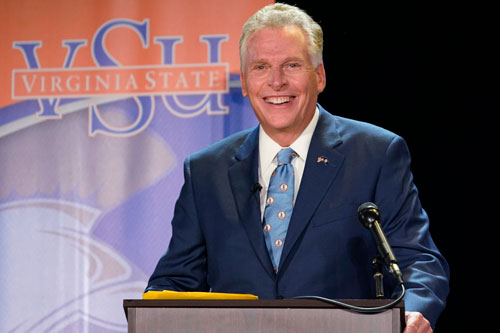Back to the future
McAuliffe seeks second term vs. newcomer Youngkin
Mason Adams //June 30, 2021//
The candidates running for governor in November face the convergence of two Virginia political trends.
The first is the commonwealth’s tendency to vote for governors of the opposing party from the present White House occupant. Beginning in 1977, Virginia has voted against the party holding the White House in every election except for 2013, when Democrat Terry McAuliffe was elected governor the year after President Barack Obama won re-election to the White House.
The second is Democrats’ recent statewide streak: No Republican has won statewide office since 2009, when the GOP swept all three statewide offices.
This year, with Democratic President Joe Biden in the White House, one of those trends must yield to the other.
In the gubernatorial race, McAuliffe will run against Republican businessman Glenn Youngkin.
Del. Hala Ayala, D-Prince William County, will face Republican former state Del. Winsome Sears in a race to become both Virginia’s first woman lieutenant governor and the first woman of color to hold statewide office in Virginia. Democratic incumbent Attorney Gen. Mark Herring will run for a third term against Republican
Del. Jason Miyares. Voters will also vote for all 100 seats in the Virginia House of Delegates, where Democrats hold a 55-45 majority.
McAuliffe appears set to become the first governor since Mills Godwin to win election twice, pundits say. The Virginia Constitution prohibits governors from holding consecutive terms.
McAuliffe’s gubernatorial tenure was marked by economic growth as Virginia fully recovered from the Great Recession, but this year many of his opponents in the Democratic primary argued that a white man no longer represents the state’s diverse demographics. His fundraising and endorsements from establishment figures, including outgoing Gov. Ralph Northam, prevented any of his opponents from collecting enough support to successfully challenge him.
He’ll face Republican Youngkin, a first-time political candidate and the former CEO of Washington, D.C.-based private equity firm The Carlyle Group. Despite Youngkin’s inexperience, he defeated a field of primary candidates that included state Sen. Amanda Chase, former House Speaker Kirk Cox and venture capitalist Pete Snyder.

Not only did Youngkin prevail over more experienced candidates, but he did so at an unprecedented, “unassembled” drive-thru Republican convention of 30,000 delegates who cast ranked-choice ballots at 39 sites across the state.
Youngkin appeals to both grassroots and establishment Republicans.
“He seems acceptable to them all — but I always add the words ‘so far,’” says Larry Sabato, founder and director of the University of Virginia Center for Politics. “One of his main problems is that Donald Trump is never going to yield center stage until he’s six feet under. That’s going to be tough for Youngkin. The only way he wins is by doing what he’s obviously going to do: Spend an unbelievable amount of his personal money, combined with Biden becoming unpopular — if he does.”
That dynamic also would need to be enough to drive down turnout among Democrats — not an unexpected possibility given Trump’s departure from elected office and social media platforms. The 2009 race that Republicans swept featured only 40% turnout. Even in the Democratic victory of 2017 — in which the two gubernatorial candidates received the highest and second highest number of votes in state history — turnout was still less than 50%.
A drop in turnout generally favors Republicans.
“Republicans will vote in every single election from the White House to the courthouse, and every time you have to convince Democrats to show up,” Sabato says.
But McAuliffe is a veteran campaigner, not just from his 2013 win and a failed 2009 primary run, but from decades of fundraising for Democrats.
“He knows how to energize the Democratic vote,” Sabato says. “He’s doing it already.”
The campaign and election will play out in a very different Virginia than that of even a few years ago. Democrats may be on a decade-plus-long streak of winning statewide elections, but control of the General Assembly eluded them until just two years ago.
Demographic and ideological shifts enabled the Democratic takeover after a generation of Republican control, or at least a party split between the governor’s office and the legislature’s two chambers. Sabato says that despite this particular race, the statewide tickets of both parties indicate a trend toward more diverse candidates who reflect a changing Virginia.
The pandemic, racial unrest and political disruption engendered by the one-two presidential punch of Obama and Trump led to a pivotal moment in Virginia.
“Everything hasn’t changed, but a lot of pieces that we thought of as ‘Old Virginia’ have been tossed into the garbage pile,” Sabato says.
Nevertheless, Democrats shouldn’t automatically assume victory, he says.
“Do you seriously think this string of Democratic victories will go on forever?” Sabato says. “Of course, it won’t. Accumulated scandals, unpopular programs — it will change at some point. I don’t think we’re necessarily there yet. I can see this going on for three terms. If you look at Virginia’s history, three terms is about it.”
Voters will decide in November whether Democrats get that third term in the Executive Mansion.
l















